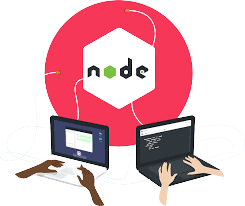Node.js has become a go-to platform for creating enterprise applications due to its capacity for handling high volumes of traffic and efficient use of resources on the system.
Node.js runs on the V8 JavaScript engine, renowned for its speed and efficiency, making it an ideal platform for applications requiring both quick response times and efficient operations.
Node.js is an open-source platform, meaning developers have access to numerous modules and libraries that enable them to construct and deploy applications quickly.
Node.js has become an ideal enterprise application development platform due to its cross-platform compatibility, developer friendliness, and robust community support. Companies looking for efficient, high-performance apps that scale well can benefit from Node.js’ help in reaching their objectives.
Why use NodeJS for enterprise applications?
 Enterprise web applications face more significant performance optimization challenges than mobile apps due to people becoming accustomed to fast applications like Netflix or PayPal.
Enterprise web applications face more significant performance optimization challenges than mobile apps due to people becoming accustomed to fast applications like Netflix or PayPal.
Businesses must ensure their enterprise applications are designed optimally to remain competitive in today’s marketplace. If your app doesn’t load within seconds, a large portion of its intended audience will disappear, making technology such as NodeJS essential for building such apps.
Let us explore some of Node JS application development capabilities and how they can assist companies in maximizing their enterprise-scale projects.
#1. Scalability and Effectiveness
Enterprise applications must be adaptable and scalable, since you never know when your business will expand beyond its current size. NodeJS is a single-threaded system that handles I/O tasks via callbacks and event lockups.
This specialized design of NodeJS enables developers to manage multiple connections simultaneously, making it ideal for enterprise apps due to its capacity to efficiently handle many connections.
#2. Coordinates multi-functional teams
Cross-functional teams are characterized by everyone being involved in every stage of development. This is an essential aspect of agile methodology, providing valuable perspectives on how the app is progressing.
Collaboration among developers will always lead to more innovations and efficient solutions for enterprise applications. NodeJS is one of the few JavaScript frameworks that can be utilized for both front-end and back-end development tasks.
If you have the staff or even hire NodeJS programmers, they can seamlessly collaborate with both sides without learning other techniques. NodeJS for enterprise applications allows you to focus on client- and server-side aspects. This makes your enterprise application robust, making future modifications more straightforward.
#3. Simplifying NPM Registry
NPM (Node Package Manager) is one of the critical functions of NodeJS, enabling developers to install, upgrade, and utilize open-source software modules without creating standard features from scratch, thus avoiding new layers of complexity in uncharted territories.
Businesses such as Fintech or Meditech that handle sensitive data like healthcare should feel comfortable placing their data into the cloud with NPM Enterprise Version, which grants access to NPM infrastructure behind your company’s firewall for added security and efficiency.
#4. Microservices Architecture
Enterprises often choose NodeJS for enterprise applications due to its ease of updating applications. Every enterprise app starts as a minor MVP release and grows over time, adding more features, users, and functions.
Before long, your team of developers may be facing an impossible project. Updating the features in your app regularly is essential for providing customers with the best experience, but this can be easier said than done!
Microservices are autonomous entities that run independently from other components. Developers can customize these microservices in various ways, enabling teams working on different programming languages to come together and collaborate within one project.
#5. Cross-platform development for enterprise apps
Platforms such as Electronjs and NW.js enable developers to build applications that run across multiple platforms using NodeJS, enabling you to reuse code written for one web app to run it on Mac OS, Windows, and Linux simultaneously.
NodeJS allows you to work with one team on web and desktop applications, eliminating the need for experts with C# or Objective-C programming languages. NodeJS developers have access to the same tools as front-end developers, making development more straightforward!
NodeJS makes it easier for developers to analyze and profile back-end and desktop applications as efficiently as client-side ones.
NodeJS developers don’t even need a Mac to create apps for Mac OS or Windows machines to create Windows apps; code sharing across platforms is usually effortless in most cases.
App development that is cross-platform using NodeJS helps businesses reduce development costs significantly.
#6. Caching allows enterprise applications to run faster.
Designers working on NodeJS enterprise apps can benefit from caching individual modules. When a user requests an initial module in NodeJS, NodeJS stores it in its memory for quicker loading of websites due to not needing to re-execute code multiple times.
Furthermore, caching within NodeJS makes navigation through the application simpler for users since its response time is relatively quick; this leads to better user experiences due to faster response times and higher SEO rankings for businesses utilizing this technology.
NodeJS for enterprise applications is an excellent choice from an SEO perspective, as businesses look into using it more often.
#7. Easy to learn and provides excellent assistance
One significant advantage of NodeJS is the speed at which it can be learned. As a Javascript-based language, NodeJS eliminates the need to learn syntax and procedures.
Programmers find it straightforward to code, build, and scale NodeJS applications using Windows and Unix simultaneously; even beginners can quickly pick up on NodeJS’ capabilities.
Conclusion
NodeJS offers a wealth of capabilities that can be invaluable when creating enterprise application development projects.
By creating an interface between back-end and front-end programming, NodeJS simplifies the development process and encourages collaboration across large teams for improved performance and efficiency in enterprise apps.
NodeJS Enterprise apps offer the most significant advantage, enabling platform development, an essential requirement when creating an MVP.
From the time you begin creating your web application to scaling it up in the future, NodeJS will be your partner in meeting all your business needs.
Related Posts:


